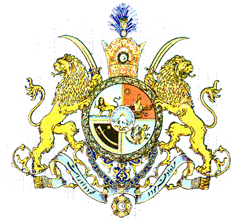

Excerpted from
The New British Oil Imperialism
By Dr. Norman Livergood
This article in PDF-file
" At the end of World War II, the British-Persian Oil Company
controlled the vast oil fields in Iran. The Persians had declared their
alignment with Adolf Hitler's Nazi "Aryan Race" movement and were
fully expecting German General Rommel to come rushing across Africa and
"free" them from the British. They had even proclaimed their
alignment with Hitler by changing the name of their country from Persia to
"Aryan," (or "Iran" in the Farsi language), but the Germans
failed to save them. To take control of Persian Gulf oil from the British, in
1954 Kermit Roosevelt, nephew of Franklin, led an American CIA coup to take
control of Iran and place in power the American-backed Shah of Iran. The Shah
expelled the British, and Rockefeller's Standard Oil now had control of the
British-Persian petroleum fields.
In the early 1950s, Occidental Petroleum's Armand Hammer, a satrap of
the Rockefellers, negotiated a deal with Russian dictator Joseph Stalin to buy
his oil--thus effectively stealing it from the Russian people. Russian oil was
then sold on the world market at a much higher price than Stalin could get by
marketing it himself, because few countries were willing to buy oil from
Stalin.
Occidental Petroleum and Russia built two large pipelines, from the
Russian oil fields down along both sides of the Caspian Sea, terminating in the
old British-Persian--now Standard Oil--oil fields in Iran. For the next 45
years, Russia secretly sent its oil out through those pipelines and Standard
Oil sold the oil on the world market at the "West Texas Crude" price
by calling it Iranian oil. For almost fifty yeas most Americans have been using
Russian oil in their cars.
Standard Oil refineries, which produce gasoline from crude oil, are
located at large sea ports like San Francisco, Houston or Los Angeles, not near
any of the large American oil fields. Most oil from the Persian Gulf is shipped
in oil tankers to those large American refinery-ports.
In 1979, the Standard Oil-backed Shah of Iran was thrown out by a
British-backed coup and the long-time British asset, Ayatollah Khomeni, put
into power. The flow of Russian oil through Iran suddenly stopped. Other oil
pipelines were constructed through Iraq and Turkey. The Russian oil was now
called OPEC Arabian-Middle Eastern oil and marketed at the even higher
"spot market" price. So in 1979, in America and Europe, we suddenly
experienced gasoline shortages and huge increases in the price of gasoline. Also
in 1979 Standard Oil-Russian oil interests tried to secure an alternate, short,
safe oil pipeline route from Russia through neighboring Afghanistan, but this
only resulted in a prolonged war and the project was abandoned.
When the new British-controlled regime in Iran came into power, the
Rockefeller-influenced U.S. government immediately threatened to seize $7.9
billion of Iranian assets located in the U.S. On November 4, 1979 Iranian
"terrorists" captured and held hostage 65 Americans. Essentially,
Standard Oil was being blackmailed by the hostage strategy. After lengthy
negotiations, the Rockefeller-created President Jimmy Carter approved the
electronic transfer of 7.9 billion dollars from U.S. accounts to the Iranian
regime on January 20, 1981.
On Wednesday January 27, 1988, as announced in the Wall Street Journal,
Standard Oil merged with British Petroleum. This actually represents Standard
Oil's buyout of British Petroleum, the name of the newly merged company being
BP-America. The Wall Street Journal did not see fit to mention worries about
the world-wide predatory marketing practices of a deceptively titled Standard
Oil regime.
During the last 13 years, BP-America has merged with, or controls, all
of the old Standard Oil "mini-companies" which existed before the
original breakup by the U.S. government in 1911. The new Standard Oil regime is
now known as BP-AMOCO, and few people in the world realize what has happened. It's
now possible to understand why British Prime Minister Blair has become the
spokesman for the new wars against terrorism (actually the war for Caspian Sea
oil)."